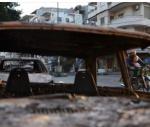You are here
Jordan ‘strongly committed’ to human trafficking fight, can do more — UN official
By Khetam Malkawi - Feb 04,2016 - Last updated at Feb 05,2016
AMMAN — Jordan is strongly committed to the fight against human trafficking, but should strengthen its legal framework and adopt preventive measures, a UN official said on Thursday.
Maria Grazia Giammarinaro, UN special rapporteur on trafficking in persons, noted that in the Kingdom there is a “will by the government to stop this [human trafficking], there is commitment and a mechanism to find cases”, saying that the challenge is to make use of this mechanism to protect people and prevent any cases in the future.
“A solid legal framework is in place. The challenge is now to fast-track the revision of the legislation for a clearer definition and effective prevention and protection of the human rights of trafficked persons — after five years of implementation — and issue a new national strategy against trafficking,” Giammarinaro said at a press conference marking the conclusion of her eight-day visit to the Kingdom.
According to the Anti-Human Trafficking National Committee’s first report for the years 2009-2013, there were 12 human trafficking cases in the Kingdom in 2012, 29 cases in 2011 and 26 cases in 2010.
In the field of preventive measures, Giammarinaro called on Jordan to increase opportunities for regular employment, ensure full implementation of recent regulations on domestic work with a view to better protect domestic workers, and increase safe migration options in order to eliminate the vulnerabilities of migrants to trafficking.
The official also encouraged the government to continue efforts to address trafficking for labour exploitation, including domestic servitude, which mostly affects young women from Southeast Asia and East Africa, as well as exploitation of Syrian refugees, including a large number of children working in agriculture and other sectors such as construction and garments.
She charged that violations against domestic workers are practised by agencies in the source countries as well as some agencies in the Kingdom.
Embassies play an active role in discovering these violations, Giammarinaro said, noting that the government of Jordan is aware of the issue and 24 agencies have been shut down in Jordan for committing violations against domestic helpers.
“Exploited and trafficked persons must be adequately supported, in cooperation with civil society organisations, and must have access to remedies including compensation,” she added, according to a statement released Thursday.
As for sexual exploitation, the official said the “possibility of sexual exploitation of Jordanian women and girls cannot be ruled out”, adding that such hidden cases can only be identified if there is an active search for them.
She noted that the refugee and asylum seeking population is particularly affected by early marriages of girls to foreigners and servile and exploitative situations including forced prostitution.
During her visit to the Kingdom, Giammarinaro met with representatives of various government agencies, the judiciary, and the National Centre for Human Rights as well as representatives of UN agencies, international organisations, civil society and victims of trafficking.
She also visited the Azraq refugee camp for Syrians, the Juweideh correctional and rehabilitation centre and two shelters for victims of trafficking, one run by the Ministry of Social Development and the other by the Jordanian Women’s Union.
The special rapporteur will present a final report on her visit to the UN Human Rights Council in June 2016.
Related Articles
AMMAN — Thirty cases related to the human trafficking of migrant workers were referred to the judiciary for further investigation in 2016, a
AMMAN — The legislation and procedures to combat trafficking in Jordan are “improving”, the government human rights coordinator, Basel Taraw
AMMAN — Twenty-nine suspected cases of human trafficking were referred to court this year, with the suspected crimes ranging from sexual exp















